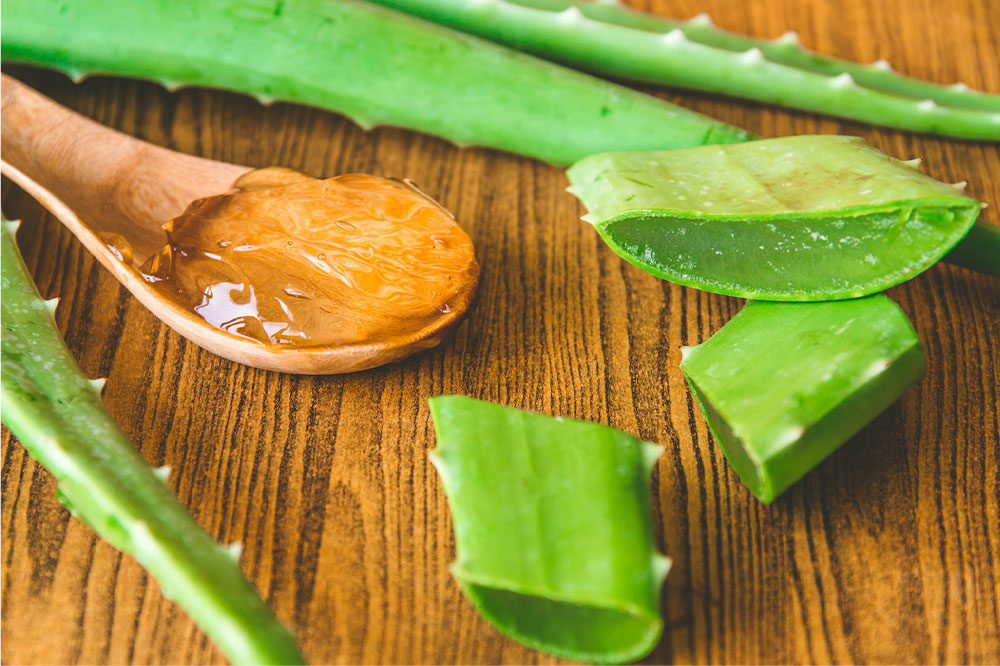Fight atopic dermatitis with these home remedies

Atopic dermatitis is a skin disorder that affects nearly 30% of people in the country. This disease causes inflammation in the skin, making it appear dry and itchy. For many people, this chronic condition can seem challenging to manage. However, various home remedies have proven effective in combating this disorder. Keep reading to learn more about some treatments you can use from the comforts of your home to reduce eczema flare-ups.
Aloe vera
People have used aloe vera for centuries to cure skin conditions like atopic dermatitis. Studies indicate that aloe vera gel has many natural benefits, such as strengthening the immune system and helping heal wounds. Aloe vera’s antibacterial and antimicrobial properties help prevent infections in dry, cracked skin. Opt for natural aloe vera gel instead of over-the-counter alternatives to avoid irritating chemicals.
Apple cider vinegar
People with skin diseases like atopic dermatitis find relief from their symptoms by trying the ancient remedy of apple cider vinegar. According to experts, apple cider vinegar can help manage this condition by helping the skin restore its acidity levels. Applied directly to the affected area or diluted with water and applied through a cotton pad on your skin, apple cider vinegar can help restore balance to troubled skin and reduce inflammation.
Colloidal oatmeal
Colloidal oatmeal, also known as Avena Sativa, is made from pulverized and cooked oats to extract healing qualities that soothe skin dryness and irritation. It does this by acting as an anti-inflammatory agent and absorbing moisture to protect the delicate skin. Colloidal oatmeal also has cleansing properties that help clear away excess oils and debris from the affected area without removing the necessary oils needed for healthy skin.
Coconut oil
Its unique combination of vitamin E and fatty acids can provide hydration while creating a barrier against further irritation and potential infection. Additionally, its anti-inflammatory properties make it a practical choice to soothe flare-ups. The oil also acts as a protective barrier to shield the skin from toxic elements, preventing contact with allergens. Moreover, virgin coconut oil reduces eczema symptoms in children within eight weeks.
Honey
People have been using honey, a natural antibacterial and anti-inflammatory ingredient, to treat wounds for a long time. Honey improves the immune system, enabling the body to fend off diseases. Honey contains antibacterial characteristics and can help treat skin conditions, including acne and psoriasis. In addition, it can speed healing, moisturize skin, and help prevent infections when applied directly to eczema-affected skin.
Tea tree oil
Tea tree oil is a popular and widely used remedy in managing eczema and other skin diseases. It works by reducing inflammation, fighting against bacterial and fungal infections, and increasing skin hydration. Its antibacterial properties make it an effective agent in preventing further breakouts and flare-ups associated with eczema.
Witch hazel
The witch hazel plant has been used for ages to soothe skin inflammation and itching associated with skin disorders like atopic dermatitis. Witch hazel is mainly known for its astringent properties, which help tighten the blood vessels near the skin’s surface and can reduce redness and swelling. In addition, regularly applying witch hazel directly to patches of eczema skin can be very helpful in reducing irritation and discomfort.
Organic soaps and detergents
The harsh chemicals in laundry detergent can worsen eczema. Certain agents like sodium lauryl sulfate are commonly present in body washes and cleansers to create a soapy lather. The lathering agents can cause the skin to become dry, especially in those with atopic dermatitis or other skin diseases.
On the other hand, organic soaps and detergents provide a healthy alternative to chemical-heavy ones, as they can help to reduce redness and irritation while restoring the skin’s moisture balance and creating a healthier environment. In addition, they are gentle on the skin without compromising cleansing power, meaning one can use them safely on even the most delicate skin types.
Nutritional changes
Some foods that you eat every day can also trigger eczema symptoms. Every food item consists of different minerals, some promoting eczema growth, such as vitamin D. Making a few significant changes to the nutritional regime might help lessen eczema flare-ups, like eating foods causing less inflammation. Additionally, certain food items have anti-inflammatory properties. Some of them include-
- Fish, beans, lentils, and leafy greens
- Organic veggies and fruits
- Cinnamon and turmeric
- Dairy products like yogurt
- Eggs
Besides these food choices, it is equally important to drink plenty of water throughout the day to keep the skin hydrated and moist, prevent flare-ups, and encourage healing.
Prescription treatment to relieve itching
Itching can be a particularly annoying and disruptive problem, so one can try certain prescription treatments in addition to these home remedies to ensure faster healing. You can apply an over-the-counter (OTC) corticosteroid cream, such as hydrocortisone, to relieve itching. In addition, you may try a menthol, camphor, or calamine-based anti-itching cream. However, it is always advisable to consult a dermatologist before taking any prescription treatment, as some may involve certain side effects.
When to consult a healthcare professional?
The home remedies mentioned above are effective to a great extent in managing atopic dermatitis and related skin diseases. However, in some instances, a dermatologist’s intervention is necessary. Persistent flare-ups that don’t respond to prescription treatments can signal an underlying health issue that only a qualified expert can detect. Additionally, consulting a dermatologist becomes even more essential if the person with eczema is young. They can recognize any potential allergic reaction and provide advice on products and moisturizers that may help reduce discomfort and irritation. Moreover, their personalized treatment regimen can go a long way toward providing relief for both short-term and long-term struggles with eczema.
Atopic dermatitis is a skin disease affecting many individuals, but one can keep its symptoms at bay with the help of various home remedies. From applying apple cider vinegar on skin-affected patches to using aloe vera gel and coconut oil, one can find plenty of items in your home to manage the itching, pain, and other atopic dermatitis-related problems. While individual reactions may vary, these natural ingredients are generally considered gentle and easy on sensitive skin. Examining what works best for you can take time, but it is a significant step toward fighting an uncomfortable health condition.

